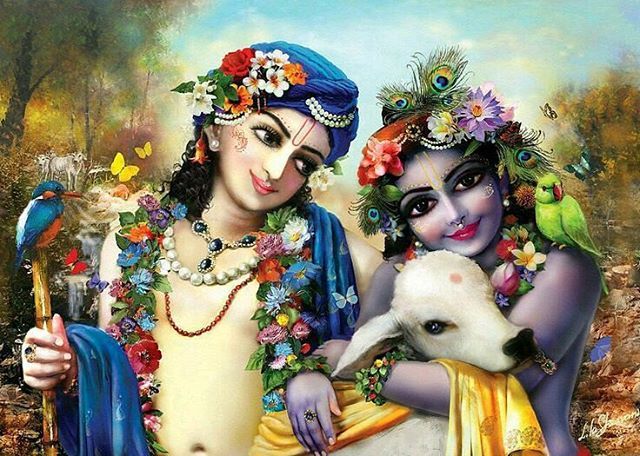Question: In Krishna’s Vraja Lila, Balarama killed two prominent demons. Is there some significance regarding why Balarama killed them instead of Krishna?
Answer by Romapada Swami:
Pralambasura represents lust and Dhenukasura represents avidya. Both of these are destroyed by the mercy of Sri Guru more than the mercy of Sri Krishna because
vikrīḍitaṁ vraja-vadhūbhir idaṁ ca viṣṇoḥ
śraddhānvito ’nuśṛṇuyād atha varṇayed yaḥ
bhaktiṁ parāṁ bhagavati pratilabhya kāmaṁ
hṛd-rogam āśv apahinoty acireṇa dhīraḥ (ŚB 10.33.39)
The Bhagavatam describes that by qualitatively hearing Krishna’s Rasa-lila Katha – śraddhānvito ’nuśṛṇuyād atha varṇayed yaḥ, it must be heard with faith and repeatedly – then Krishna’s pastimes can purify the heart of the lusty desire, provided this katha is heard from the lips of Sri Guru. This is the point. Sri Guru as the representative of Baladev Prabhu, Baladev Tattva, is speaking Hari Katha and destroying the Pralambasura-like lusty desires in the heart. It’s not Krishna directly destroying our lust. Of course, we can say that Balarama is Krishna in His first expansion. Likewise, we can say that Guru is also ‘sākṣād-dhari’, but he is simultaneously priya evatasya. Similarly, in his Manah-Siksa, Sri Raghunath Das Goswami says mukunda-preṣṭhatve, that Guru is very very dear to Mukunda, Krishna, therefore considered to be as good as God. The same can be said for Baladeva and Sri Krishna. While it is indeed Krishna’s pastimes which destroy lust, yet the purification is happening through Guru Tattva, Baladeva Prabhu, who actually does it through Hari Katha and Hari Kirtan.
Also, it is described,
praviṣṭaḥ karṇa-randhreṇa
svānāṁ bhāva-saroruham
dhunoti śamalaṁ kṛṣṇaḥ
salilasya yathā śarat ŚB 2.8.5
Another verse in the Bhagavatam explains that Hari Katha when spoken from the lips of Sri Guru enters the heart and dhunoti śamalaṁ kṛṣṇaḥ salilasya yathā śarat, then that Hari Katha destroys śamalaṁ which means the contamination in the heart. This is represented in Balaram’s killing Pralambasura.
Regarding Dhenukasura, it is more straight forward: oṁ ajnāna-timirāndhasya jnānānjana-śalākayā, it is Guru Dev, or Guru Tattva, the Akhanda Guru Tattva which destroys avidya, brahmāṇḍa bhramite kona bhāgyavān jīva guru-kṛṣṇa-prasāde pāya bhakti-latā-bīja.
The name ‘Guru’ comes first in that verse, because it is Guru who gives Krishna to the disciple, after Krishna has given Guru to the disciple.
We might say that it is Krishna who destroys avidya, but in the form of Sri Guru. Many verses can be quoted, indicating that Guru destroys ignorance.
Interesting: Sri Hari Suri writes in Bhakti Rasayan about Balaram killing Dhenukasura. He mentions that Krishna was thinking as follows, when Krishna was about to kill Dhenukasura.
Krishna thought that Dhenukasura was in the shape of a donkey, and ‘donkey’ in Sanskrit is “Khara.” Khara and Dushan are demons in Rama Lila who were killed by Lord Rama. So, in short, history shows that Khara has been destroyed by Rama. Therefore, to keep tradition, in this Leela also Rama or Balarama should kill Khara – which is a pun because Khara is the name of the demon in the past life in Rama Lila, but also Khara in Sanskrit means a donkey.
So, Hari Suri writes that Krishna looked at the donkey and thought “Oh, here is Khara. Since Khara in the past was killed by Lord Rama, therefore even now Khara should be killed by Balarama.”







